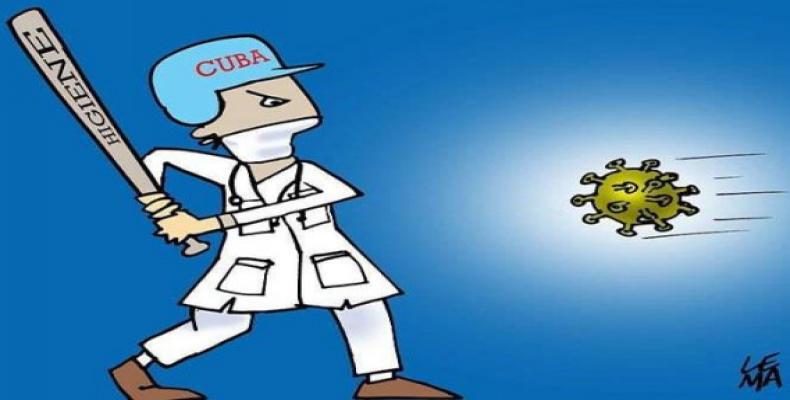During Thursday’s press briefing on covid-19, Dr. José Raul de Armas Fernández, head of the group on transmissible diseases of the Cuban Health Ministry, confirmed that there are 11 cases of covid-19 in Cuba, five foreigners and six Cubans who came in contact with infected people coming from or traveling abroad.
“There are currently 356 people hospitalized in Cuba, including the 11 confirmed cases and others who are suspected cases or came in close contact with those infected,” he said.
Of that figure, he said that 101 are foreigners, all of whom are in stable condition, with good health. He stated that none of the identified patients in Cuba is in critical condition.
Dr. Fernández stressed that the country is intensifying control and surveillance at entry ports, particularly with respect to travelers arriving from countries with a high incidence of the virus, taking into account that all patients reported in Cuba are imported covid-19 cases.
“The measures are aimed primarily at strengthening international health surveillance, either at entry ports or for travelers who are already in Cuba,” he said.
The head of the group on transmissible diseases of the Cuban Health Ministry insisted that the country has all the necessary resources to test, identify and treat patients of covid-19, including health personnel, hospital beds and medication.
At Thursday’s press briefing, Dr. Manuel Romero Placeres, director of the Havana-based Pedro Kouri Tropical Medicine Institute (IPK), reported that the center is currently focusing on the new coronavirus COVID-19, working closely with the Cuban Health Ministry and the Pan-American Health Organization- World Health Organization (PAHO/WHO).
“Ever since the outbreak in late December, we have created the conditions to receive and treat patients detected at entry ports. At this moment, there are 42 people hospitalized at the Pedro Kouri Institute. Of those, 33 are suspected cases and 5 are confirmed cases of covid-19. None of the patients is in critical condition,” he insisted.
The director of the Pedro Kouri Institute explained that one of the main focuses of the Center’s work has been personnel training to develop the necessary capabilities to test, identify, handle and treat patients properly.
“We have trained the personnel in the two laboratories, one in Santiago de Cuba and the other in Villa Clara, that are fully operational devoted to the covid-19, besides our reference lab here in Havana. All three labs are working 24/7 in the processing of samples received from across the country and releasing the results within 24 hours. Of course, we are complying with each and every safety regulation for these cases.”
The IPK director stressed that besides training the lab personnel and doctors, nurses and health personnel at all levels of healthcare across the country, the training extends to Cuban collaborators, members of the Henry Reeve Brigade who are already offering their services in the battle against this disease in countries like Venezuela and Nicaragua.
“We have trained a large number of doctors, nurses and health technicians, who are now ready and willing to go to other countries, upon those countries’ request, to assist in the fight against covid-19, without neglecting protection of our population. Sending health personnel on missions abroad to assist other peoples in need is in full compliance with the solidarity principle defended and promoted by the Cuban Revolution.”
Meanwhile, Yanira Gómez Delgado, director of specialized education activities at Cuba’s Education Ministry, said at the press conference that although new measures are being constantly adopted to strengthen control and surveillance in school centers across the country, there is no need for school closures at the moment, as there is no community transmission of the disease in the country.
She explained that preventive health measures have been increased, and all the complementary, non-essential school activities have been either delayed or suspended, and that the teaching and non-teaching staff, as well as students at all levels, from daycare centers to the universities, are being permanently trained on the various ways that the disease is transmitted and how to protect themselves against it.
The education official insisted that there has been not a single case of transmission of covid-19 in any educational center across the country, and so, there is no need at this moment to close schools.
“At this moment, there is no need for that. It is not prudent. Closing educational centers at this moment would only generate unnecessary alarm and panic. We are duly complying with all established regulations. We are strengthening sanitation and surveillance activities, training students and school personnel and preventing people with respiratory symptoms from accessing our centers, which significantly lowers the risk of infection in our schools.”
The director of specialized education activities at Cuba’s Education Ministry stressed that the situation is being monitored on a daily basis and measures will be adopted as they are needed.
In the Q&A segment of the press conference on Thursday, Dr. José Raul de Armas Fernández, head of the group on transmissible diseases of the Cuban Health Ministry, insisted that Cuba does not rule out closing its borders, if there was a need for that. He insisted that a National Group has been set up that reviews the situation on a permanent basis.
On the news that China reported no new cases of covid-19 infection on Thursday, for the first time since the outbreak in December, the Cuban health official said it was very good news.
“We appreciate the huge capacity of China. The Chinese government and people have fully demonstrated their huge capacity to control a serious, mass epidemic in such a short period of time. They have set an example for the whole world.”


